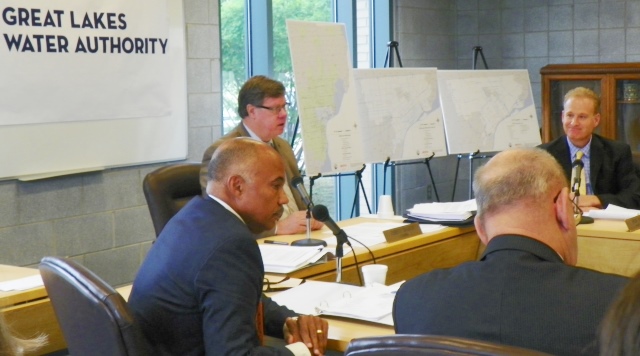
GLWA meeting June 12, 2015: (l to r) co-chair Gary Brown of Detroit, chair Robert Daddow of Oakland County, Board member Brian Baker of Macomb County, with maps showing areas covered by GLWA.
Great Lakes Water Authority contract with city a SALE, not a lease
Means higher water/sewerage rates for population of six counties
Detroit water shut-offs, attachment of unpaid water bills to property taxes, to be continued
Contract subject to referendum vote of people of the city of Detroit; DAREA votes to begin petition collection process in coalition with others
DAREA also files new challenge to bankruptcy plan citing Illinois Supreme Court decision striking down pension cuts as unconstitutional
By Diane Bukowski
June 15, 2015
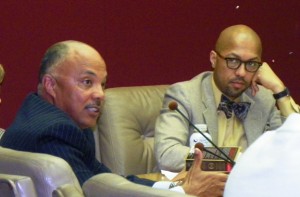
Gary Brown speaks at Detroit City Council meeting April 3, 2012, next to Council Pres. Charles Pugh. The next day, the Council voted 5-4 to approve a Consent Agreement with the state that led eventually to the state takeover of Detroit and bankruptcy declaration. Brown and Pugh also sat on “Roots Cause” committee, signed document agreeing to separate DWSD from Detroit in 2011. Pugh later absconded his post after allegations that he was a child molester surfaced.
DETROIT – “We’ve been waiting for this for 40 years,” a beaming Gary Brown, co-chair of the Great Lakes Water Authority (GLWA), an entity organized under the Detroit bankruptcy plan, boasted June 12.
Brown is also COO of the City of Detroit under “Mayor” Mike Duggan. During its meeting that day, the six-member GLWA board voted 5-1 to approve a contract with the City of Detroit that is an irrevocable sale, not a lease, of the Detroit Water and Sewerage Department (DWSD).
The GLWA will pay only a total of $1.4 billion for the $6 billion system. It is expected to approve skyrocketing rate increases, and will continue water shut-offs and the attachment of unpaid water bills to property taxes for Detroiters. (See link for entire contract at end of story.)
Six major items still need to be completed before the contract actually takes effect, no later than Jan. 1, 2016. These include agreements with customer communities to have the GLWA assume their contracts, the Detroit General Retirement System to provide information on pension obligations, 51 percent of bondholders to agree to have the GLWA assume $5.2 billion in DWSD debt, bond rating agency confirmation that ratings will be no lower than current DWSD bond ratings, legal opinions that bonds are still non-taxable, and adoption of a bond ordinance.
Crain’s Detroit Business quoted Doug Scott of Fitch Ratings Ltd., who said the current DWSD debt load is a problem.
“The limit on their revenue-generating ability would be a factor. It could be a credit negative, depending on the situation — it’s certainly not a credit positive,” Scott said. “But I can’t say it’s a definite negative in this situation, since we have other factors to look at, like how affordable rates are right now. That could be an offset.”
Scott also cited the alleged four percent cap on rate increases, which has already been removed in the plan, likely at Wall Street’s direction.
During bankruptcy negotiations, the “City” as represented by Jones Day had proposed that DWSD bondholders take a $2.3 billion cut. Bankruptcy protesters had pointed to at least one illegal DWSD interest swap agreement amounting to $537 million. However, provisions creating the Great Lakes Water Authority restored the full debt load.
Another hurdle to enactment of the Authority is the state law authorizing the contract. Public Act 233 of 1955, “Municipal Water and Sewer Supply Systems,” allows the affected municipality a people’s referendum vote on the contract.

Bill Davis, President of DAREA (l) carries banner at Wayne County tax foreclosure protest June 8, 2015.
The Detroit Active and Retired Employees Association (DAREA) voted unanimously at its meeting June 15 to begin that process, drafting petition language and reaching out to other organizations, especially those concerned about the people’s water rights, to join in collecting the 15,000 petition signatures needed according to PA 233. Members said they were outraged at what they called the theft of Detroit’s six-county system, and provisions in the contract, some of which are noted below.
“We have to continue fighting,” DAREA President Bill Davis said. “If not, they’ll think we have given up.” Yvonne Williams Jones encouraged members to take up the battle any way they can, including in the streets.
Davis also announced that DAREA had just filed a supplemental brief to its appeal of the Detroit Bankruptcy Plan of Adjustment, which authorized the creation of the GLWA.
The brief cites the resounding decision of the Illinois State Supreme Court which struck down all cuts to state employee pensions enacted in 2013 by the State Legislature, saying they violated state constitutional protections that prohibit “diminishing or impairing” such benefits. The language is virtually identical to that in Michigan’s Constitution.
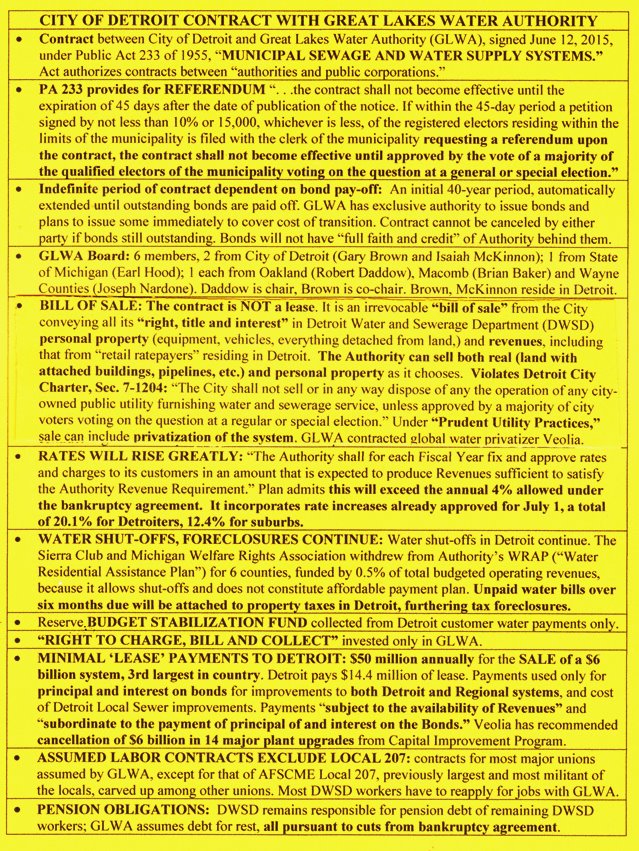 “You do not have the authority to take this vote,” a City of Detroit retiree told the GLWA board at the outset of their meeting June 12. “Under the City Charter, DWSD assets can only be sold or transferred after a vote of the people. This action will destroy Detroit, the largest and poorest Black-majority city in the country. Detroit has the highest unemployment rate in the U.S., but this agreement takes away thousands of jobs from city workers. Fifty-nine percent of Detroit’s children, and 39 percent of its population, live in poverty.”
“You do not have the authority to take this vote,” a City of Detroit retiree told the GLWA board at the outset of their meeting June 12. “Under the City Charter, DWSD assets can only be sold or transferred after a vote of the people. This action will destroy Detroit, the largest and poorest Black-majority city in the country. Detroit has the highest unemployment rate in the U.S., but this agreement takes away thousands of jobs from city workers. Fifty-nine percent of Detroit’s children, and 39 percent of its population, live in poverty.”
Another retiree, Cindy Darrah, said, “This is illegal. People can’t afford to pay their water bills now. It’s hard to pay when you don’t have a job. You are voting for something that 99.9 percent of the public has never seen, while their public taxes are paying for a new hockey arena and the M-1 rail system.”
Darrah also raised the issue of the Toledo water crisis, noting that residents of Toledo don’t have the right to weigh in on the agreement.
Retirees earlier said it was a “near catastrophic failure” of DWSD sewage pumps after massive lay-offs in the Wastewater Treatment Plant last year that led to pollution of Lake Erie, from which Toledo draws 80 percent of its water supply. They said the failure also caused great flooding of Detroit sewers, streets and homes at the same time. The WWTP is currently under the management of private contractor EMA, which recommended the elimination of 81 percent of the DWSD workforce.

Metro Detroit’s “Raging Grannies,” part of a national organization, sing against takeover, water shut-offs at GLWA meeting June 12, 2015.
Whether the condition of DWSD’s infrastructure will improve under the GLWA is questionable. They have hired global water privatizer Veolia as an advisor.
Veolia has recommended the cancellation of $600 million in Capital Improvement Program funds that were to finance 14 major plant upgrades.
The Raging Grannies presented the GLWA with a song decrying water shut-offs during the meeting.
Earlier, both the Sierra Club and the Michigan Welfare Rights Organization resigned from the Water Residents Assistance Program created by the GLWA, because it did not stop water shut-offs and did not constitute a true water affordability program.
DWSD is the third largest public municipal facility in the U.S, owned and controlled by Detroit since 1836. It has revenues of $6 billion annually, and provides service to almost one million people in Detroit and three million in 127 Michigan communities throughout Wayne, Oakland, Macomb, St. Clair, Lapeer, Genesee, Washtenaw and Monroe counties.
According to terms of the contract, the GLWA will pay $50 million annually to the city of Detroit for 40 years, subject to numerous conditions, which amounts to about $1.4 billion. Conditions include payment by the city itself of $14.4 million of the annual amount, and availability of sufficient revenues after the payment of bond debt. Under the plan, the Authority will assume $5.2 billion in DWSD bond debt, and immediately borrow $300 million again.
The GLWA will control and collect customer rates and payments, incorporating approved increases of 20.1 percent for Detroiters and 12.4 percent for suburbanites set for July 1.
Despite Detroit bankruptcy plan promises that GLWA rate increases would be limited to 4 percent a year, the contract says, “The Authority shall for each Fiscal Year fix and approve rates and charges to its customers in an amount that is expected to produce Revenues sufficient to satisfy the Authority Revenue Requirement.”
The “Revenue Requirement” prioritizes the payment of bond debt. The GLWA has the exclusive authority to issue bonds and plans to do so abundantly, beginning with a $300 million bond to finance the transition from DWSD to GLWA. Under the plan, the Authority will also assume $5.2 billion in DWSD bond debt.

Nurses at July, 2014 national protest against Detroit water shutoffs, in downtown Detroit. A nurse also spoke at the GLWA meeting June 12, 2015.
GLWA’s Macomb County board member Brian Baker, the sole “No” vote on the contract, said that he expects rate increases to run at least 10 percent a year.
He also blasted what he claimed was Detroit’s “lack of responsibility” for collecting bad debts from its customers. The DWSD began water-shuts again last month.
Unlike Brown, also a former City Councilman and Detroit police officer, city officials have fought a regional takeover of the system for decades. DWSD’s six-county infrastructure was built with bonds paid for by Detroiters.
“This is nothing but a takeover, a power grab for the largest asset the city holds,” former Detroit City Councilwoman JoAnn Watson said at a council meeting in Nov. 2012. “It would be malfeasance for any elected official to advocate breaking it up, divvying it up. There is no drinking water in the country better than ours. DWSD is a magnificent asset, paid for by the citizens, owned by the citizens, and run by the citizens. This is a disgrace before God!”
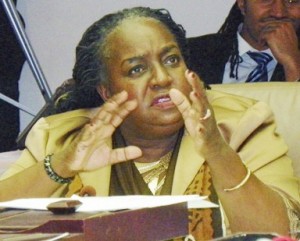
Former Detroit Councilwoman JoAnn Watson led the triumphant battle against Michigan’s first emergency manager act, Public Act 4. Michigan Gov. Rick Snyder and the legislature, acting on the advice of Jones Day, later replaced it with the referendum-proof PA 436.
Watson was responding to a revelation that Brown and former Council President Charles Pugh had signed a secret “Roots Cause” committee agreement to separate DWSD from the city, in front of U.S. District Court Judge Sean Cox.
Pugh is now in disgrace after being exposed as an alleged child molester. He abdicated his post after voting to allow the state takeover of Detroit under a Consent Agreement, and has been working as a waiter in New York City according to local media reports.
Unlike his predecessors, particularly Mayor Coleman A. Young, who opposed a regional takeover of DWSD, Detroit’s new “Mayor” Mike Duggan, allegedly elected on write-in ballots after a court ruled he had not been a resident of Detroit long enough, issued the following statement.
“This is an historic step forward in resolving decades of conflict between Detroit and our suburban neighbors. Detroit will have the resources we need to rebuild our city’s crumbling water and sewer pipes. County leaders will have a true voice in running the part of the system that serves the suburbs. Each community will be responsible for its own water and sewer bills. And, we have created a new $4.5 million assistance fund to help low income families afford their water bills.”
GLWA board members credited Duggan with breaking an impasse in negotiations when he agreed to have lease payments to the city remain within the GLWA system.
At last report, about 500 of more than 1,400 current DWSD workers will remain with the city, while about 900 more will become authority employees. DWSD workers have all been asked to re-apply for their jobs.
Although the authority claimed it is honoring all labor contracts in effects, an attachment to the plan left out AFSCME Local 207, which used to represent 1200 DWSD workers. It was the most militant water department local, supporting a wildcat strike by Wastewater Treatment Plant workers in Sept. 2012. Local 207 members warned that the future of the entire City of Detroit was at stake, but representatives of AFSCME Council 25 sabotaged the strike. Other unions have now carved up most of the local’s membership, leaving it with only a little over 100 workers.

 TO CONTACT DAREA REGARDING THE REFERENDUM CAMPAIGN TO STOP THE DWSD TAKEOVER , call 313-649-7018, or reach Communications Committee Chair Diane Bukowski at 313-825-6126; email detroit2700plus@gmail.com or diane_bukowski@hotmail.com ASAP.
TO CONTACT DAREA REGARDING THE REFERENDUM CAMPAIGN TO STOP THE DWSD TAKEOVER , call 313-649-7018, or reach Communications Committee Chair Diane Bukowski at 313-825-6126; email detroit2700plus@gmail.com or diane_bukowski@hotmail.com ASAP.
- All organizations and individuals are invited to endorse the campaign and collect signatures for the referendum petitions, speakers available.
- Next DAREA membership meeting Wed. July 1, 2015 @ 5:30 pm. Sts. Matthew and Joseph Episcopal Church, Woodward at Holbrook; complete financial report at every meeting.
- DAREA Prayer Breakfast-Fundraiser DAREA prayer breakfast.
Link to entire GLWA-Detroit Contract: http://glwater.org/wp-content/uploads/2015/06/Executed_Package-REVISED-6-12-15.pdf
PUBLIC ACT 233 of 1955: mcl-Act-233-of-1955 DAREA supplemental appeal brief 6 5 2015.compressed
Some of many related stories:
http://voiceofdetroit.net/2012/09/27/detroit-dwsd-debt-shows-wall-street-never-loses-on-bad-swaps/


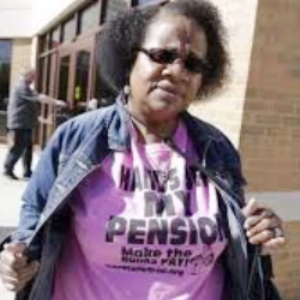

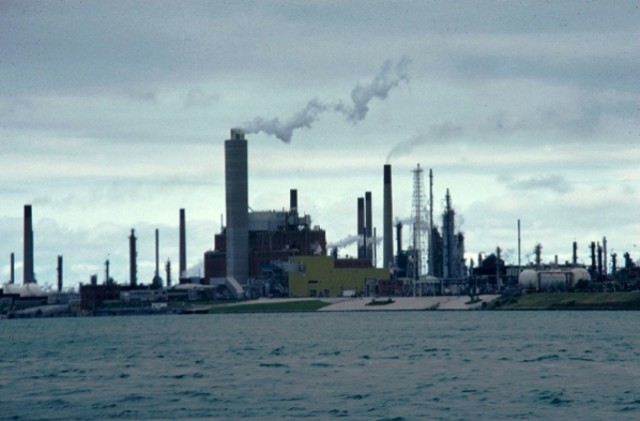


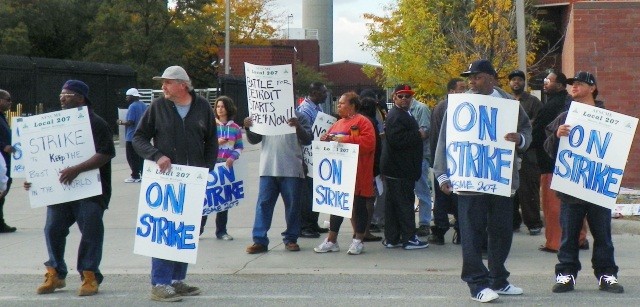
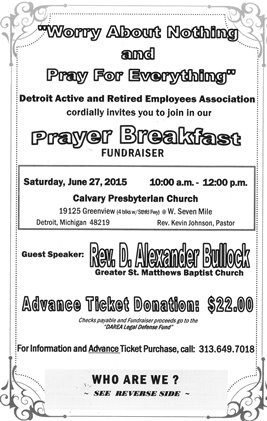
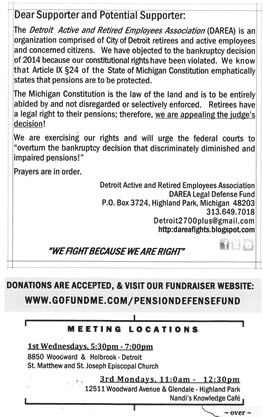




Mis-leading article, interjecting opinion in place of facts, and it plays fast and loose with the truth/reality of the situation.
As long as #bonds are outstanding, neither #Detroit or #GLWA can terminate #lease, whether or not a default event occurs.
There never will be a “sale”. It is a legal agreement.
You apparently did not read the 330+ page contract attached to the article, if you want the FACTS and the TRUTH. Yes, it does say as long as #bonds are outstanding, neither #Detroit or #GLWA can terminate #lease, whether or not a default event occurs. However, no bonds have been sold as yet; Wall Street is still debating the GLWA’s ability to pay them off, with the $5.2 billion in debt remaining after $2.3 billion of the bonds, originally set to be cut under the Plan of Adjustment, were unimpaired by a vote of the BOWC, which later became part of the Plan of Adjustment and now the GLWA. READ THE CONTRACT–IT STATES CLEARLY, EMPHATICALLY AND REPEATEDLY THAT IT CONSTITUTES A SALE OF DWSD’S PERSONAL PROPERTY (i.e. infrastructure–plants, pipelines, equipment, etc.) AND ALL OF ITS REVENUES TO THE GLWA. If the GLWA decides it doesn’t need parts (or all) of DWSD, it can also SELL the real estate. Yes, it’s a legal agreement under P.A. 233 of 1955 (read that as well), which allows for a referendum vote of the people within 45 days on the agreement. There should have been a vote anyway under terms of the City Charter, which says DWSD assets cannot be sold or transferred without a general vote of the electorate. YOU are the one interjecting opinion in place of facts.
Correction to the reply above: PA 233 of 1955 states that the signatures must be collected within 45 days of the public notice indicting the people of the municipality have a right to a referendum on the contract.